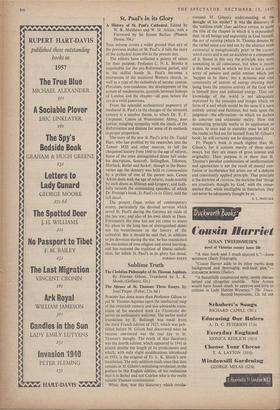Sublime Truth
The Christian Philosophy of St. Thomas Aquinas. By Etienne Gilson. Translated by L. K. Shook. (Gollancz, 42s.) NOBODY has done more than Professor Gilson to put St. Thomas Aquinas upon the intellectual map of the twentieth century and this admirable trans- lation of his standard work Le Thomisme de- serves an enthusiastic welcome. The earlier useful translation by E. Bullough was made from the third French edition of 1927, which was pub- lished before M. Gilson had discovered what he became convinced was the real key to St. Thomas's thought. The result of that discovery was the fourth edition, which appearedin 1941 at almost double the length of its predecessors and which, with only slight modifications introduced in 1953, is the original of Fr. L. K. Shook's new translation. The only addition made since that date consists in M. Gilson's tantalising revelation, in the preface to this English edition, of his realisation that it is Bafiez and not Cajetan who is the really reliable Thomist commentator.
What, then, was this discovery which revolu- tionised M. Gilson's understanding of the thought of his master? It was the discovery of the 'sublime truth' (hoc sublimis veritas, to quote the title of the chapter in which it is expounded) that, in all beings and supremely in God himself, the act of existing (which St. Thomas denotes by the verbal noun esse and not by the abstract noun existentia) is metaphysically prior to the essence which exists and is not an accident or a component of it. Stated in this way the principle may seem unexciting in all conscience, but what it means is that the world in which we live is not a static array of passive and pallid entities which just `happen to be there,' but a dynamic and vital community of centres of energy drawing their being from the creative activity of the God who is himself pure and unlimited energy. Thus our knowledge of the world is not adequately expressed by the concepts and images which we form of it and which would be the same if it were entirely unreal and fictitious, but rests upon the judgment—the affirmation—in which we declare its concrete and existential reality. How this dominating principle works in its application to nature, to man and to morality must be left to the reader to find out for himself from M. Gilson's book; he will certainly not be disappointed.
Fr. Pieper's book is much slighter than M. Gilson's, for it consists merely of three short essays, but they are essays of great interest and originality. Their, purpose is to show that St. Thomas's peculiar combination of intellectualism and agnosticism is not the result of mental con- fusion or incoherence but arises out of a definite and consistently applied principle. That principle is the doctrine of creation, the doctrine that 'things are creatively thought by God,' with the conse- quence that, while intelligible in themselves, they can never be adequately thought by us.
E. L. MASCALL






































 Previous page
Previous page